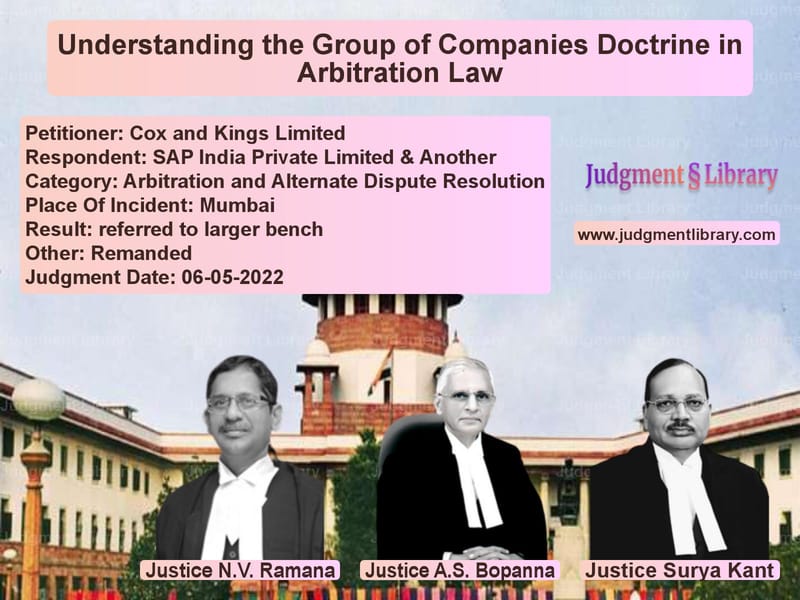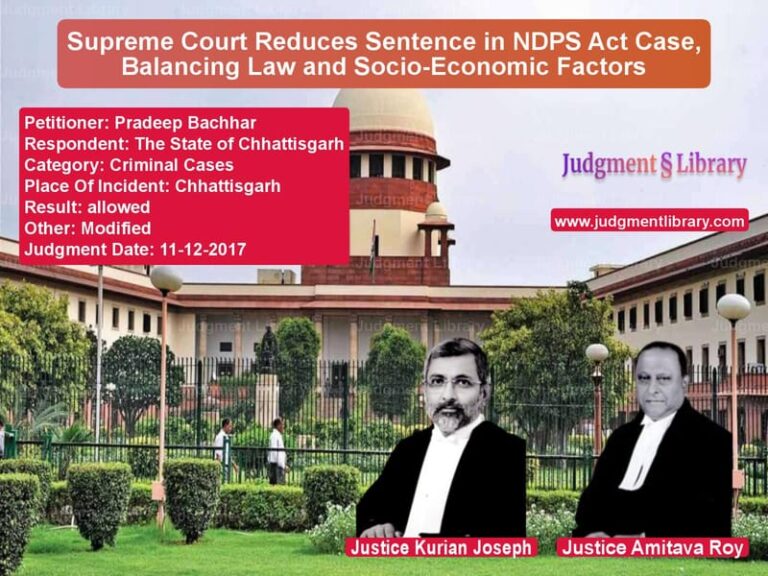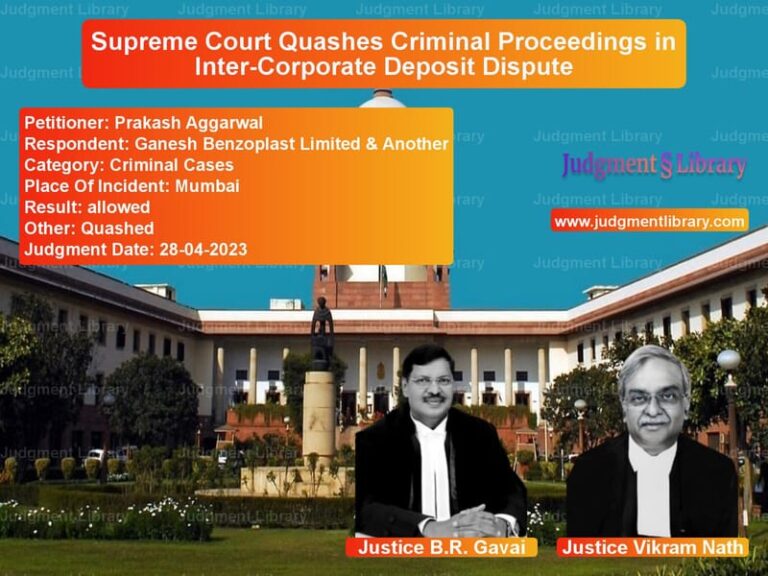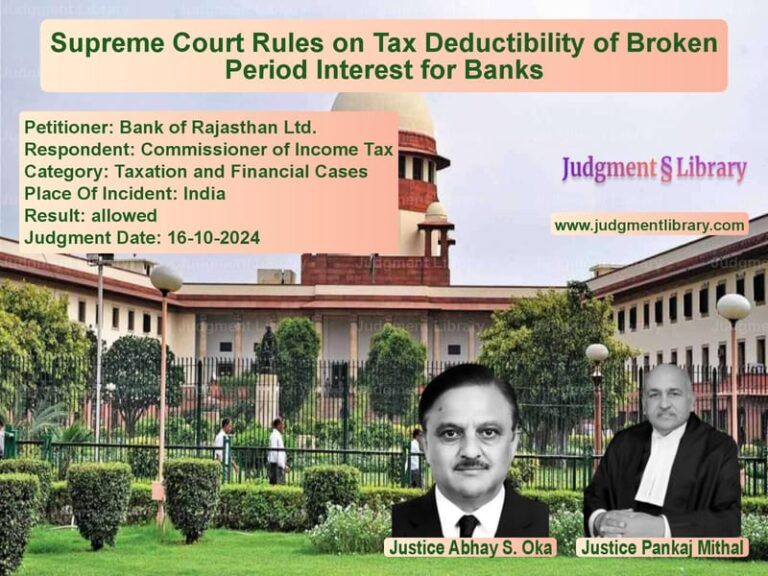Understanding the Group of Companies Doctrine in Arbitration Law
The Supreme Court of India, in the case of Cox and Kings Limited v. SAP India Private Limited & Another, deliberated on the ‘Group of Companies Doctrine’ and its applicability in Indian arbitration law. This doctrine has long been a subject of debate, particularly concerning party autonomy in arbitration agreements and corporate personality under company law.
At the heart of the dispute was whether Respondent No. 2, a parent company, could be compelled to participate in arbitration proceedings despite not being a signatory to the arbitration agreement. The petitioner, Cox and Kings Limited, argued that the agreements were interconnected and formed a composite transaction, making Respondent No. 2 a necessary party.
Background of the Case
The dispute arose from multiple agreements signed between the parties regarding the implementation of SAP Hybris software for Cox and Kings Limited. Initially, an SAP Software End User License Agreement and an SAP Enterprise Support Schedule were signed between the petitioner and Respondent No. 1. The parties later executed further agreements for software customization and implementation.
The agreements contained an arbitration clause stipulating that any dispute arising out of them would be referred to a three-member Arbitral Tribunal in Mumbai. However, disputes arose concerning the execution of the contract, leading to the termination of the agreement by the petitioner and a demand for a refund of Rs. 45 crores. Respondent No. 1 instead invoked arbitration, seeking damages amounting to Rs. 17 crores.
Arguments by the Petitioner
The petitioner, represented by Senior Advocate Kailash Vasdev, contended:
- That Respondent No. 1 was a wholly owned subsidiary of Respondent No. 2, and the customization of the software could not be carried out without the aid of Respondent No. 2.
- That the agreements and email correspondences demonstrated that both respondents and the petitioner were in agreement regarding the execution of the contract.
- That according to the ruling in Chloro Controls India Pvt. Ltd. v. Severn Trent Water Purification Inc., arbitration could be extended to non-signatories if the circumstances showed mutual intention.
Arguments by the Respondents
On behalf of Respondent No. 1, Senior Advocate Ritin Rai argued:
- The petitioner had previously opposed arbitration when Respondent No. 1 had invoked it, making the current petition contradictory.
- The timing of the fresh arbitration notice, issued immediately after the imposition of a moratorium under the Insolvency and Bankruptcy Code, suggested an attempt to inflate claims by dragging Respondent No. 2 into the arbitration.
Senior Advocate Neeraj Kishan Kaul, appearing for Respondent No. 2, submitted:
- That Respondent No. 2 was neither a signatory to the agreement nor had it ever agreed to be bound by the arbitration clause.
- That emails cited by the petitioner did not indicate any binding commitments by Respondent No. 2.
- That the “Group of Companies” doctrine was inapplicable since there was no participation by Respondent No. 2 in contract negotiations.
Observations by the Court
Chief Justice N.V. Ramana, in his judgment, scrutinized the application of the Group of Companies Doctrine in Indian arbitration law. He noted that arbitration is inherently a matter of party consent and that any extension of arbitration to non-signatories must be backed by a strong legal basis.
He emphasized that:
- The doctrine had been applied inconsistently in Indian jurisprudence.
- The 2016 amendment to the Arbitration Act introduced the phrase ‘claiming through or under,’ but whether it could be interpreted to include the Group of Companies Doctrine needed further examination.
- The law laid down in Chloro Controls and subsequent cases required reconsideration, as it appeared to be based more on economic convenience than legal principles.
Reference to a Larger Bench
Given the complexity and significance of the issue, the Court referred the matter to a larger Bench to decide:
- Whether the phrase ‘claiming through or under’ in Sections 8 and 11 of the Arbitration Act could be interpreted to include the Group of Companies Doctrine.
- Whether the doctrine, as expounded in Chloro Controls, was valid in law.
Justice Surya Kant, concurring with the referral, argued that the doctrine was integral to Indian arbitration law and should not be discarded. He pointed out that many business transactions involved family-run companies where commercial dealings were often intertwined, making the doctrine practically significant.
Implications of the Judgment
The referral of this matter to a larger Bench highlights the Court’s cautious approach towards extending arbitration agreements to non-signatories. The final ruling on this issue will have far-reaching consequences on arbitration in India, particularly for corporate groups engaged in multi-party agreements.
The judgment underscores the need for clarity in arbitration law regarding when non-signatories can be compelled to arbitrate. It also serves as a reminder that arbitration remains a creature of contract and cannot be imposed merely for convenience.
The outcome of this reference will set a precedent for future arbitration cases, influencing how Indian courts interpret corporate relationships in arbitration disputes.
Petitioner Name: Cox and Kings Limited.Respondent Name: SAP India Private Limited & Another.Judgment By: Justice N.V. Ramana, Justice A.S. Bopanna, Justice Surya Kant.Place Of Incident: Mumbai.Judgment Date: 06-05-2022.
Don’t miss out on the full details! Download the complete judgment in PDF format below and gain valuable insights instantly!
Download Judgment: cox-and-kings-limite-vs-sap-india-private-li-supreme-court-of-india-judgment-dated-06-05-2022.pdf
Directly Download Judgment: Directly download this Judgment
See all petitions in Arbitration Awards
See all petitions in Commercial Arbitration
See all petitions in Dispute Resolution Mechanisms
See all petitions in Arbitration Act
See all petitions in International Arbitration
See all petitions in Judgment by N.V. Ramana
See all petitions in Judgment by A. S. Bopanna
See all petitions in Judgment by Surya Kant
See all petitions in Referred to Larger Bench
See all petitions in Remanded
See all petitions in supreme court of India judgments May 2022
See all petitions in 2022 judgments
See all posts in Arbitration and Alternate Dispute Resolution Category
See all allowed petitions in Arbitration and Alternate Dispute Resolution Category
See all Dismissed petitions in Arbitration and Alternate Dispute Resolution Category
See all partially allowed petitions in Arbitration and Alternate Dispute Resolution Category







